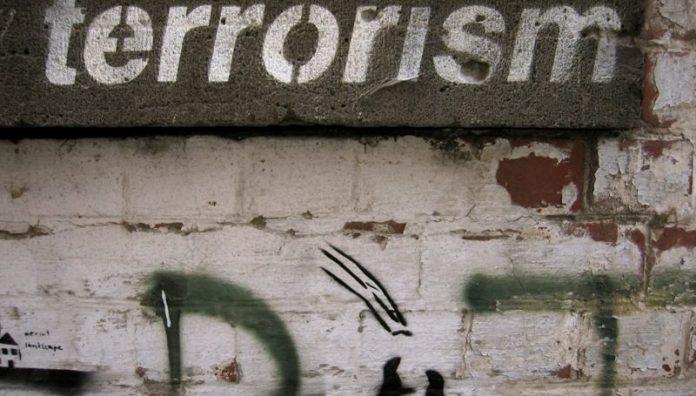This article is written by Souradh C. Valson, from Government Law College, Thiruvananthapuram, and discusses how terrorism threatens the rule of law.
Table of Contents
Introduction
Perhaps in recent years, no other human activity has had a substantial and direct impact on people across the world like terrorism. These antisocial activities not only affect the lives of the individual but have also allowed greater intrusion by states in the affairs of citizens. Besides the impact on those directly affected, terrorism has also changed the view of those not directly affected by it.
Article 21 of the Constitution guarantees the right to life and is the most important fundamental right available to citizens. Terrorist acts threaten the fundamental right to life of citizens. The protection of life, human rights, and liberty is the constitutional mandate.
Responsibility of the state and respecting human rights
Ensuring the security of an individual is an important function of the State. The states must protect the citizens by taking steps to curb all forms of violence, including terrorism, and in bringing the perpetrators before the law.
The anti-terrorism laws enacted by the state are sometimes alleged, and at times found to be in violation of human rights. The states impose such harsh measures to provide a proportional response to the terrorists.
It is not uncommon to see states adopting forcible measures like torture to counter-terrorist activities. Using these measures overshadows the existing legal framework in our country. The role of the media in these matters is inevitable. Trials are often affected by emotions and unnecessary pressure imposed by the media. Judiciary has the responsibility to uphold the rule of law and overlook the distractions.
The states must not exceed the law while enacting legislation that curbs terrorism. Laws must be made within the framework set by the constitution. If the state encroaches on these limits, there will be a violation of the rule of law and will subsequently reduce the faith in the constitution.
Attempts are made to silence the voice of journalists, human rights activists, and advocates using counter-terrorism as a cover. Additionally, by building the presence of a threat, the states transfer the funds allocated for social welfare programmes to strengthen the armed forces. It appears at this stage that a proper objective definition of terrorism is required.
Principle of legality
Defining terrorism
- In the battle against terrorism, human rights and the rule of law are the foundational stones. To properly define terrorism, we must distinguish it from other crimes to understand the special nature of terrorism and to see if it requires special treatment.
- Terrorism can be defined as a violent act against innocent civilians in furtherance of an ideological or political aim. Although a common international definition of terrorism is yet to be reached and decided upon; different resolutions, declarations, and other treaties highlight the fundamental elements of terrorism that may be used to determine what constitutes terrorism. Defining terrorism is important to prevent the states from confusing ordinary acts with extraordinary acts. The Parliament has given a very ambiguous definition of terrorism under both the Terrorist and Disruptive Activities Act, 1985 (TADA), and the Prevention of Terrorist Act, 2002 (POTA).
- In Hitendra Vishnu Thakur v. State of Maharastra, the Supreme Court held that; a precise definition of terrorism is not possible. However, terrorism can be described as using violence when the intended purpose is neither mental nor physical damage but a long-lasting psychological impact or one that is capable of such an impact on society as a whole. The court also stated that the objective of terrorism is to shake the peace and tranquility and to create fear in society.
- Although a precise definition of terrorism is not possible, proper care and caution must be exercised to prevent ordinary criminals from the persecution of the rigorous anti-terrorism laws.
- Several instances of the misapplication of anti-terrorism laws are common in our country. In 2002, during the Gujarat riots, there was a blatant misapplication of POTA. A literal definition of such a law would probably include the rioters under POTA. However, reading the law in the context of the riots will not attract punishment under POTA. After years of waiting, the High Court ultimately acquitted the convicts from POTA.
- Even today, many prisoners are awaiting trials for determining whether anti-terrorism laws are applicable in their case or not. Simultaneously, we must acknowledge that terrorism is not an ordinary offence.
- Contrary to an ordinary offence, the object of terrorism is neither temporary nor targeted at a specific individual. Terrorism doesn’t differentiate and is not motivated to confine the damage to one individual.
Features of anti-terrorism legislation
In the book Morality of Law, Lon Fuller provides the minimum conditions for the legality that can be used to guide the conduct of human beings by specific rules. He uses a parable to explain ‘eight routes of disaster’ they are:
- Deciding each specific on its own due to a failure to enact generalized laws.
- Failing to publicize or at least communicating to the accused the laws that he is supposed to observe.
- Abusing retroactive legislation.
- Failing to make the rules understandable.
- Enacting contradictory laws.
- Enacting laws that require an action that is beyond the control of the aggrieved party.
- Introducing frequent changes.
- Creating a gap between enactment and implementation.
These principles contain the essence of the rule of law. Unfortunately, these principles are not applied in many of the statutes, delegated laws, and judgments regarding terrorism.
As discussed above, a precise definition of terrorism is not possible. That being said, at present, there is no similarity between the definition of terrorism and the principles of legality. A huge gap exists between the laws and the application and execution of them. Terrorism is always used in a derogatory manner. In almost all cases, terrorist acts will be covered under ordinary criminal laws, therefore raising particular crimes as a terrorist act will require great legislative analysis. Just because terrorists and Naxalites have renounced the constitution, they cannot be denied constitutional protections.
Branding as terrorists
In recent times, the arrest of citizens after terrorist attacks solely based on their religious association shows that there is an absence of application of judicious mind by the executive. Upholding the presumption of the innocence of the accused is often not followed. Courts are not always able to dispose of the case within a reasonable time, and even if the judgment results in an acquittal, the accused may not be able to return to normalcy. Law enforcement agencies must ensure that they are careful while applying these strict laws.
Justifications that are given for the special measure
Given the special nature of the crime and its severe consequences, the states are justified in taking special measures in proportion to the offence. The state must also define the laws and punishments very clearly. These measures include:
- Enacting laws with detailed detention procedures and pretrial investigation.
- Giving admissibility to police confessions.
- Constituting special courts with special procedural rules.
- Allowing adverse presumptions and inferences of guilt.
- Establishing administrative and judicial oversight.
- Offering official immunity.
The doctrine of proportionality
- Emphasis should be placed on fulfilling the doctrine of proportionality; there should be a substantial relationship between the object and means of the law.
- A public policy should not be too broad in scope or too burdensome in its application.
- To ensure that counter-terrorism legislations are properly enforced, the objectives must not be vague and clearly defined. It is very important because India witnessed a certain kind of discrimination towards a particular community during an era of terrorism. These acts violate both the principle of proportionality and the structure of our constitution.
- Another possible drawback is considering non-violent, ideological protestors under the banner of terrorism.
- In Chhattisgarh, many leaders supporting the tribals were taken as waging war against the country. If the states adopt such a loose definition, there could be an infringement of the fundamental right of freedom of speech and expression.
- The object of every anti-terrorism law is to reduce the threats to the country. Anti-terrorist operations must focus on dealing with conditions that give rise to extremism or that pressurize the youth to take up armed resistance so that the citizens are not alienated from the state.
- One way to prevent the alienation of citizens is to include them in the decision making process.
- We must not only look at the harsh measures taken by the government to curb terrorism but also be aware of the minor ways in which the government control and curb the fundamental rights of the citizens in the name of terrorism every day.
- Foucault says that governments exercise power in different ways; some enforce discipline by physical punishment, and some by subtly controlling the minds of citizens in factories, schools, workplaces, and homes.
Balancing approach
The main challenge in expanding the state’s power to fight terrorism is in finding a balance between liberty and security. The constitutional framers in India and around the world have only provided for a very minimal departure for extraordinary measures.
There are many arguments against the balancing approach. Lucia Zedner, a British legal scholar, argues that the balancing approach cannot indicate the importance that should be placed on security and liberty. Furthermore, the balancing approach fails to take into account the conceptual and philosophical ideas of security and liberty. The close association between liberty and security makes separating them difficult to balance them.
Balancing between community rights and individual rights is another limitation of the balancing approach. Using the voice of the majority to overcome arbitrariness is an important feature of the community.
Now we should attempt to answer the question; will the sacrifice of liberty yield better security for the citizens? Although a generalized answer is not possible for this, we have seen that in certain areas, using extreme measures did not reduce terrorism but increased the violence.
Relationship between terrorism and socio-economic rights
Any attempt to curb terrorism must contain measures to eradicate terrorism and eliminate the causes of terrorism, such as:
- The violations of human rights and the rule of law.
- Discrimination based on religion, ethnicity, and nationality, and the marginalization of the socially and economically backward classes.
- Promoting the active participation of citizens and ensuring proper leadership in civil society; criticizing the violations of human rights, restricting such violations in national law, timely investigations, and prosecution of perpetrators and preventing them.
- Giving proper attention to those suffering from human rights violations by compensation and restitution.
At times, the state will also commit acts against which the state has an obligation to protect its people. The state will blatantly disregard all oppositions and act without constitutional morality.
For example, the Government of India waived certain criminal charges against the accused based on a compromise with the government of Portugal, when the Supreme Court upheld the decision of the TADA courts in Mumbai. These actions by the government not only violate international laws but contradicts the constitutional morality of the state and will lead to citizens questioning the legitimacy of the states.
Some findings show that countries that lack civil rights are more prone to terrorism and adds to the fact that terrorism is not economic but political in nature. Although terrorism springs from political causes, before long, it will have an economic aspect. If the government fails to fulfill its obligations, the citizens will adopt a system that provides protection even if it is dangerous.
The tribals and backward classes are neglected, so they use extreme measures to get the state’s attention. When the state actors commit violence alone or as a part of a conspiracy with other private actors, it motivates the citizens to adopt extreme measures.
That being said, violence against the innocents is violence, nonetheless, whatever be the cause. There are some legitimate cases where violence may be the result of an unresolved issue. However, in most cases, the perpetrators have a definite agenda to inflict fear on the citizens.
Conclusion
Law alone cannot promote human rights or reduce terrorism. All humans want to live in a peaceful surrounding, to achieve that, we must try to minimize violence, and the State must ensure the participation of citizens in different ventures. We should try to uphold the constitution and make sure that the rights put forth by it are followed. It is clear that many discussions and debates are required to ensure that the rule of law is not threatened even during trying times.
References
- 1994 AIR 2623, 1994 SCC (4) 602
- http://www.wbja.nic.in/wbja_adm/files/Law,%20Terrorism
- http://www.supremecourtcases.com/index2.php
LawSikho has created a telegram group for exchanging legal knowledge, referrals and various opportunities. You can click on this link and join:
 Serato DJ Crack 2025Serato DJ PRO Crack
Serato DJ Crack 2025Serato DJ PRO Crack











 Allow notifications
Allow notifications


